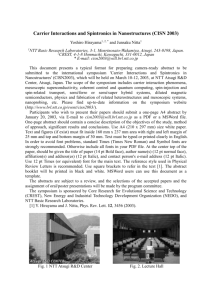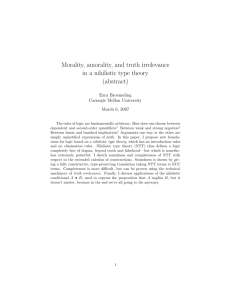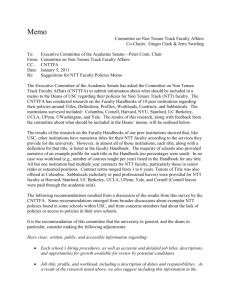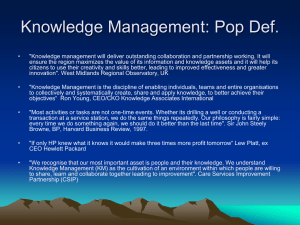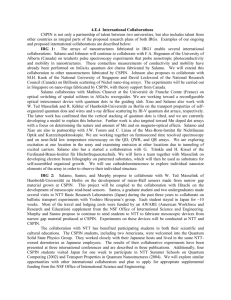SM000714
advertisement
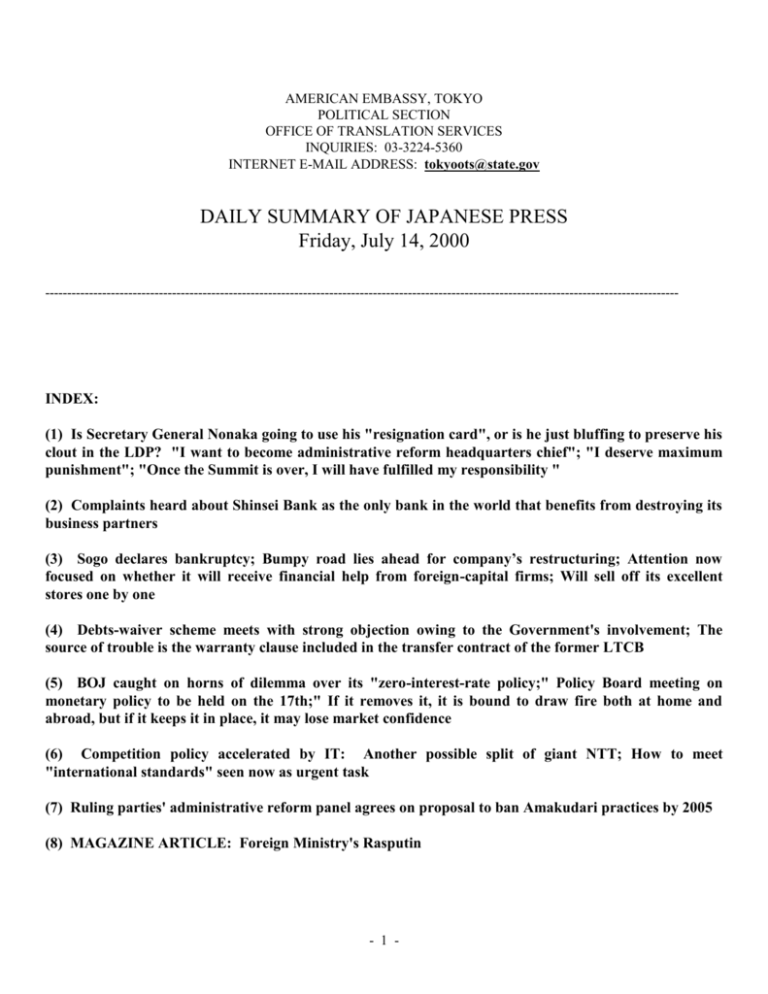
AMERICAN EMBASSY, TOKYO POLITICAL SECTION OFFICE OF TRANSLATION SERVICES INQUIRIES: 03-3224-5360 INTERNET E-MAIL ADDRESS: tokyoots@state.gov DAILY SUMMARY OF JAPANESE PRESS Friday, July 14, 2000 ------------------------------------------------------------------------------------------------------------------------------------------------- INDEX: (1) Is Secretary General Nonaka going to use his "resignation card", or is he just bluffing to preserve his clout in the LDP? "I want to become administrative reform headquarters chief"; "I deserve maximum punishment"; "Once the Summit is over, I will have fulfilled my responsibility " (2) Complaints heard about Shinsei Bank as the only bank in the world that benefits from destroying its business partners (3) Sogo declares bankruptcy; Bumpy road lies ahead for company’s restructuring; Attention now focused on whether it will receive financial help from foreign-capital firms; Will sell off its excellent stores one by one (4) Debts-waiver scheme meets with strong objection owing to the Government's involvement; The source of trouble is the warranty clause included in the transfer contract of the former LTCB (5) BOJ caught on horns of dilemma over its "zero-interest-rate policy;" Policy Board meeting on monetary policy to be held on the 17th;" If it removes it, it is bound to draw fire both at home and abroad, but if it keeps it in place, it may lose market confidence (6) Competition policy accelerated by IT: Another possible split of giant NTT; How to meet "international standards" seen now as urgent task (7) Ruling parties' administrative reform panel agrees on proposal to ban Amakudari practices by 2005 (8) MAGAZINE ARTICLE: Foreign Ministry's Rasputin - 1 - other ruling camp executives immediately dissuaded him from resigning. ARTICLES: (1) Is Secretary General Nonaka going to use his "resignation card", or is he just bluffing to preserve his clout in the LDP? "I want to become administrative reform headquarters chief"; "I deserve maximum punishment"; "Once the Summit is over, I will have fulfilled my responsibility " The next time was on July 1. In a faction chiefs' meeting for launching a new Cabinet, Kato called for discussions in the LDP to be more open. In response, Nonaka said, "I am ready to step down anytime to take responsibility." Moreover, in an interview on July 7, Nonaka remarked, "Once the Summit is over, I will have fulfilled my responsibility." ASAHI (Page 4) (Full) July 13, 2000 Reporters asked Nonaka about his true intention, but he never offered a clear response. Nonaka seems to be enjoying the fallout from his remarks. Some junior members think he is just crying wolf. Liberal Democratic Party (LDP) members are perplexed with Secretary General Hiromu Nonaka's repeated hints about his resigning from his current post. As Prime Minister Mori's powerful backer who represents the former Obuchi faction, the largest in the LDP, if Nonaka resigns at this point, it would invariably shake the Mori Administration's very foundation, which is already sinking. Nonaka's resignation might trigger a shift of "power" to the YKK trio, including former secretary general Koichi Kato. Is Nonaka serious about using his resignation card? Or, having lost his political "patrons," namely, former prime ministers Noboru Takeshita and Keizo Obuchi, is it just an "unusable card," albeit a vital one for his continuing to hold political sway in the LDP? Worn out? The prevalent view now is that Nonaka made the above comments before the election and on June 25 out of consideration to the LDP, which was becoming more disgruntled over the poor election cooperation, as well as to the New Komeito. At the same time, the remarks might be a "curve ball" to put Prime Minister Mori and his aides off guard, while they were merrymaking after winning a ruling camp majority in the election. [Yoshiyuki Komurata] Some LDP executives deem, "Mr. Nonaka was burned out after the fierce election campaign." Pro-Nonaka members share the view that Nonaka's high survivability comes from his apparent ability to detach himself from power. They feel Nonaka's series of comments hinting of his resignation conversely has uplifted his presence. Four times in a month Over the last month, Nonaka has hinted at resigning four times. The first time was on June 22 in Kyoto. He told local supporters: "If possible, I would like to be LDP administrative reform headquarters chief after the election…" Then on June 25, on election day, he hinted at it again. As he learned of the New Komeito's serious setback, Nonaka said, "I deserve maximum punishment." Prime Minister Mori and Nonaka became deputy secretary general immediately after resigning as chief cabinet secretary under prime minister Obuchi. Witnessing such developments, some other members do not take Nonaka's words at face value. They say, "Mr. Nonaka repeatedly indicated that he would become - 2 - a rank-and-file member with no executive title. But that never happened" (former Cabinet minister). (2) Complaints heard about Shinsei Bank as the only bank in the world that benefits from destroying its business partners No patrons YOMIURI (Page 8) (Full) July 13, 2000 With the absence of Takeshita and Obuchi, however, the position of the Obuchi faction and that of Nonaka have become less secure. The department-store chain Sogo Co. has filed for court-mandated rehabilitation under a new bankruptcy law designed to give firms facing imminent collapse a jump-start toward rehabilitation. Sogo will now begin the legal process. In the banking world, which is certain to see losses increase, criticism is mounting of Shinsei Bank, which frustrated the bailout scheme by refusing to write off Sogo's loans. The environment around Nonaka in the LDP is changing. The view in the party that is growing is that Nonaka himself realizes that he has to hold on to the secretary general's post for the time being. The more Nonaka's position becomes shaky, the more he needs to rely on his "resignation card." But the more he uses the card, the more it loses its effectiveness. Objections are rising particularly against Shinsei Bank Chairman & President (Chief Executive Officer) Masaki Yashiro, who has made such statements as: Nonaka's recent remarks hinting at resignation [Before the election] I will devote myself to the upcoming election. And (after the election), if possible, I would like to become the party's administrative reform headquarters chief … (on June 22, in Kyoto). "Banks acting in concert to write off debts follows the logic of the 'banking village.' It is inappropriate for Shinsei Bank to agree to the scheme for we were reorganized into a new bank though the injection of a vast amount of taxpayers' money." [Election day] In particular, we have put the New Komeito to much trouble. I deserve maximum punishment (on the night of June 25, on an NTV program). In rebuttal, a city bank executive claimed: "The debts-waiver program could help collect more loans from Sogo. It is strange for him to criticize the decision based essentially on economic rationality as 'the logic of the banking village.'" [After the election] I will have fulfilled my responsibility once the lower house election and the Summit are over. If possible, I want to be placed in a less demanding position that will allow me to take action boldly in carrying out administrative and fiscal reforms. At the same time, I need to avoid acting hastily so as not to cause any negative impact on the new Mori Cabinet (July 7, in an interview with the media, including the Asahi Shimbun). Firms relying on Shinsei Bank as a major bank are going bankrupt in succession, such as leading consumer credit firm Life Co. Ltd. and the Daiichi Hotel. Pointing to this circumstance, such criticism is heard as: "Shinsei Bank is the only bank in the world that benefits from wrecking its business partners" (another major city bank executive). A high-level city bank officer gave this remark: "If banks are irresponsible for management (00071304st) - 3 - of their business partners, that means the banking side is the ultimate moral hazard." (4) Debts-waiver scheme meets with strong objection owing to the Government's involvement; The source of trouble is the warranty clause included in the transfer contract of the former LTCB (00071304ku) YOMIURI (Page 9) (Full) July 13, 2000 Ailing department store chain Sogo Co. was pressed hard to give up on restructuring its operations by waiving some of the company's debts and to instead file for court protection under a new law designed to let firms facing an imminent collapse jump-start rehabilitation -- a prebankruptcy rehabilitation law. Behind this move is the strong criticism of "the Government that was about to bail out a private firm." The Government, specifically, was involved in private firm Sogo's debts-write off issue because it concerned the private banking institution Shinsei Bank (formerly the Long Term Credit Bank [LTCB]). The root cause of why the Government came to have a hand in the deal made between private firms lies in the LTCB restructuring mechanism. When the LTBC went bankrupt, it was temporarily placed under state management and later reconstructed as a private bank. (3) Sogo declares bankruptcy; Bumpy road lies ahead for company’s restructuring; Attention now focused on whether it will receive financial help from foreign-capital firms; Will sell off its excellent stores one by one YOMIURI (Page 9) (Lead Paragraph) July 13, 2000 Debt-ridden department store chain Sogo Co. has given up on self-restructuring and instead has filed for court protection under the law designed to let firms facing imminent collapse jump-start their rehabilitation process. Under court control, Sogo will endeavor to restructure its operations in line with the legal framework. Under the law, Sogo's debts totaling 1.87 trillion yen will be certain to be curtailed drasticly. The company will then be free from that huge obligation, a stumbling block so far in the company's efforts to reorganize itself. However, Sogo has suffered a blow to its image since it has gone bankrupt in effect, so the company faces a rough road ahead before it can win back the consumers' trust. Considering that Sogo is by far larger in size than other distribution industry companies that collapsed in the past, it will likely have many more difficulties seeking help from other firms and choosing a new management lineup. The LTCB collapsed in October 1998 and was subsequently put under state control. Later, it looked for a party to purchase it. On that occasion, how to handle the loans held by the LTCB to the Sogo group emerged as a big problem. No purchaser wants to assume loans that could turn uncollectable down the road. It was thus only natural to think about some kind of safety-net measures for losses that might arise in the future. But the financial reconstruction law does not have provisions stipulating loss compensation if losses arise after corporate transfer. Consequently, negotiations on the transfer of the LTCB ran into a road block. (00071306ku) - 4 - Setting aside the loans to firms whose management is going downhill from the loans the buyer side will take over could help proceed transfer negotiations smoothly. But the fear in this case is that once the Resolution and Collection Corporation (RCC) commences collecting the loans that are left untransferred, loan-borrowers might see their management deteriorate in one swoop. (5) BOJ caught on horns of dilemma over its "zero-interest-rate policy;" Policy Board meeting on monetary policy to be held on the 17th;" If it removes it, it is bound to draw fire both at home and abroad, but if it keeps it in place, it may lose market confidence NIHON KEIZAI (Page 5) (Full) July 13, 2000 What came out as a last resort in a bid to finalize transfer talks was a "warranty clause," which is based on the thinking under the civil code that if a purchased good is found to be defective, the good is returnable. The idea was to include the clause in the transfer contract. Regarding its zero-interest-rate policy, the Bank of Japan (BOJ) is now caught between two arguments put up in and outside Japan -- one calling for a prompt lifting of such and the other claiming that it is premature to do so. The money market is generally discounting the possibility of the BOJ Board meeting opting for the removal of such at its monetary policy meeting to be held on the 17th. The BOJ is concerned that if it does lift that policy line, it may impair market confidence in its monetary policy. In the meantime, the prevalent view of the Government, the Liberal Democratic Party (LDP) and the business world is that it is too early to do so. In addition, there has appeared the issue of the liquidation of major department chain operator Sogo, which requires cautious consideration. An increasing number of Policy Board members now support the removal of the policy line. The situation is, however, that it is still unclear whether the removal of such will get the approval of the majority. The transfer contract concluded with U.S. Ripplewood Holdings LLC. eventually included the warranty clause that indicates that if the value of the loans decline 20 or more percent within three years after the transfer, the Deposit Insurance Corp. (DIC) will buy back the loans at book value. When Sogo, after suffering financial difficulties, called on creditor banks to waive claims on the loans to the company, Shinsei Bank, following the warranty clause, asked the DIC to purchase the loans to the Sogo group. The DIC had no choice but to accept Shinsei Bank's request. Also in order not to directly trigger a bankruptcy of Sogo, it judged it necessary to agree to forgive Sogo's debts as requested by Sogo. The FRC as well gave a nod to the DIC's decision. Aftermath of bankruptcy of Sogo Because of the circumstances where "no one could have purchased the LTCB if no warranty clause had been added" (senior official of the FRC), the warranty clause as a last resort was added to the contract to transfer the LTCB to another company. This last resort clause was in the end the source of trouble this time. The filing of a court-mandated rehabilitation by Sogo is likely to have impact on the BOJ's monetary policy in a delicate way. There is concern that if the bankruptcy of Sogo produces a domino effect among its business partners, it would dampen the business sentiment of consumers and companies. (00071305ku) The view prevailing the Government and the LDP is that with the Group of Eight Summit Conference (Okinawa Summit) only a week or so - 5 - away, it is premature to lift the zero interest policy, contrary to the ongoing economic policy line of giving priority to turning the economy around. Top business leaders, such as Takashi Imai, chairman of the Federation of Economic Organizations (Keidanren), and Hiroshi Okuda, chairman of the Japan Federation of Employers' Associations (Nikkeiren), unanimously take the position that it is too early to lift the zero-interest rate policy. deflationary concern is beginning to dissipate. However, Nobuyuki Nakahara, a deliberation member, is most likely to oppose the removal of such. Other deliberation members, such as Tohio Miki, Kazuo Ueda and Teizo Taya, have indicated a cautious stance in judging a right timing. At present, it is not possible to categorically say that those who are in favor of lifting the policy line command a majority. The BOJ adopted the so-called zero-interest policy in February 1999 with the aim of providing more liquidity to the money market, by guiding overnight call loan rates to 0 percent. Since then, the economy has taken an upward turn for selfsustained recovery. Judging that the "situation where the dissipation of deflation concern can be envisioned" – a condition the BOJ has set for lifting its zero-interest policy – is close at hand, the BOJ has searched for the timing for doing so. (00071303yk) Moves that "removal" NIHON KEIZAI (Page 1) (Excerpts) July 12, 2000 discount zero-interest (6) Competition policy accelerated by IT: Another possible split of giant NTT; How to meet "international standards" seen now as urgent task policy On the 12th the call market saw the yield of three-month government securities rise to 0.277 percent. The move apparently indicated that the market has discounted the removal of the BOJ's zero-interest policy, by raising the target of guidance for the rate of overnight call loans to 0.25 percent. Whether to "dismantle" the Nippon Telegraph and Telephone Corp. (NTT) group has quietly become a major topic for discussion. Minister now urged to make up his mind If the BOJ decides to continue the present zero-interest policy at the meeting on the 17th, chances are then disenchantment will permeate on the market that "the BOJ has postponed the removal of its policy line, succumbing to pressure from the political and business worlds and the U.S., which hopes that the BOJ will keep that policy line in place." If market confidence in the BOJ declines, it could undermine the efficacy of its monetary policy. The Ministry of Posts and Telecommunications (MPT) has in mind a scenario for a second breaking up of the NTT group. The plan calls for the Government to sell all the NTT stocks it possesses and to uncouple NTT DoCoMo from NTT. NTT will cut connection charges it imposes on other carriers and promote market access to its facilities, such as telegraph poles. In return, the Government will allow NTT East and NTT West – the regional carriers – to expand their business activities. Many of the nine BOJ Policy Board members are now leaning toward lifting the zerointerest policy line, taking the position that "Japan cannot catch up with the United States unless it adopts a genuine policy to stimulate competition." This advice was given by a senior - 6 - MPT official while briefing newly-installed MPT Minister Kozo Hirabayashi on July 4, when the second Yoshiro Mori Cabinet was launched. addressed the structural problem of breaking up American Telegraph & Telephone (ATT). In Japan as well, since the privatization of [NTT] in 1985, the Anti-Monopoly Law has applied to the telecommunications market, but the FTC so far has remained silent. When the central government is reorganized in January 2000, both the MPT and the FTC will come under the control of the new Ministry of General Affairs. In part because of this circumstance, MPT is eagerly looking for ways to emerge from the previous regulation-driven administration, while the FTC is busily trying to play up its raison d'être. Both the NTT Law and the Telecommunications Business Law are characterized as having strong aspects of a command-style administration, focusing on licensing, for instance, instead of promoting competition among firms. MPT, however, now insists, "We need to radically switch from the previous way of thinking, if we want to bring about inexpensive telecommunications rates and highspeed Internet" (Telecommunications Bureau). The ministry is looking for ways to switch policy from the previous protective administration toward firms through business regulations to one that would "promote competition" as well as provide for "follow-up monitoring." Even in the NTT group, calls for fostering competition are growing. NTT DoCoMo Chairman Koji Ohboshi, who has engineered the company's rapid leap forward, has come out in favor of another breakup of NTT. If DoCoMo is completely uncoupled from NTT, a new-born DoCoMo and other new common carriers, such as Japan Telecom Co., can line up on equal footing. They eventually might call on NTT's regional carriers to reduce linkup charges. In the meantime, the Fair Trade Commission (FTC), which is tasked with competition policy, is making its move at a long last. One commissioner is aiming to look into the dispute involving conventional phones and cellular phones, which are both supposed to vie against each other. In March, the official in an article contributed to a technical journal stressed: "NTT is the leader in the fixedphone business, while NTT DoCoMo is the leader in the cellular-phone world. NTT's holding of more than half of DoCoMo's stocks in a way results in placing a curb on competition between the two businesses." In the meantime, NTT has been quick to rally. Sensing that MPT is moving to switch its policy line, NTT has begun contacting the Liberal Democratic Party (LDP) postal policy clique [yuusei-zoku) for prior consultations on the issue of whether to cut interconnection fees, a thorny problem lying between Japan and the U.S. Thanks to its groundwork, NTT has succeeded in getting MPT to accept NTT's proposal for a 22.5 percent cut over three years. The previous breakup of NTT useless As if to endorse his argument, a study group under the FTC released a report in mid-June which concluded that "last year's breakup of NTT has failed to spur competition." It urged splitting apart NTT in a more complete manner. With an eye now on next year's upper-house election On July 7, the LDP Telecommunications Council held a staff meeting, in which a leading lawmaker urged that "should there be any funds available to reduce linkup fees, a fixed Internet account for free use should be introduced in local areas, such as my electoral district." With the In the United States, the Department of Justice has played a role in promoting competition in the telecommunications area. In 1984, it - 7 - upper-house election set for next year, some party members are inclining toward pork-barrel approaches rather than pushing for another breakup of NTT. This holds true also for the opposition camp. A Minshuto (Democratic Party of Japan) member, backed by NTT-affiliated labor unions, visited senior MPT officials, including the director general of the Telecommunications Bureau, and warned them, "A sizable cut in linkup charges would deal a serious blow to NTT's management." (7) Ruling parties' administrative reform panel agrees on proposal to ban Amakudari practices by 2005 NIHON KEIZAI (Page 2) (Full) July 13, 2000 The ruling parties' "Administrative and Fiscal Reforms Promotion Council" decided in its first meeting yesterday to address administrative and fiscal reforms by focusing on reform of special corporations and imposing a ban on Amakudari (“descent from heaven” or retired senior government officials obtaining high-level posts in the private sector) practices. The council is composed of the secretaries general and policymaking officers of the three ruling parties – the Liberal Democratic Party, New Komeito and Hoshuto (Conservative Party). LDP Secretary General Nonaka, who chairs the council, stated, "We would like to draft administrative and fiscal reform measures by year's end, eyeing the reorganization of the central government that starts January 6 2001." The U.S. is a country that is not very strict toward corporate mergers, but in the telecommunications area, to bring about brisk competition, it seeks to constrain "giant firms" from gaining excessive control over the market. In Japan, the aim of last year's breakup of NTT was "to keep up with international competition letting NTT remain a giant." But is such logic acceptable today? For users, an inconvenient telecommunications infrastructure only increases the digital divide, standing in the way of individuals and firms trying to compete internationally with counterparts in other countries. The Mori Cabinet has declared information technology (IT) to be its showcase program for revitalizing the economy. An electronic government, Internet-based education, and ecommerce are all related to the IT revolution. The key to Japan's future lies in its ability to establish a telecommunications infrastructure that can bear comparison with the international standard. Should NTT be broken up again? Or will Japan aim at becoming an IT-based nation by forming another set of competition measures? Japan has no time to stop and think about it. In the first meeting, the council decided to include among items for consideration: (1) the streamlining of special corporations, licensed companies, and public interest organizations, including the option of scrapping them; a ban on Amakudari practices, and reform of the civil servant system, including extending the retirement age to make up for the amakudari ban; (2) introduction of a regulation-evaluation system; (3) review of burden sharing and allocation of finances between the central and local governments; (4) consignment of over-the-counter services by the central and local governments to specific postal offices; and (5) a second reorganization of NTT to ready it for the information technology (IT) revolution. [Shingo Miyake of the Economic Department] (00071203ku) (00071304ys) - 8 - resolution ordering Tanaka and Amano to stand down from attending the negotiations. Hiroyuki Arai, a lower-house member representing the group, called on Tanaka and read the resolution aloud to him. (8) MAGAZINE ARTICLE: Foreign Ministry's Rasputin BUNGEI SHUNJU (Page 234-235) (Full) July 2000 The most conspicuous issue lying between Japan and the United States is the size of cuts in interconnection rates charged by Nippon Telegraph and Telephone Co. (NTT). The discord has increasingly become stronger between the Ministry of Foreign Affairs (MOFA) -- which desperately wants to resolve the issue before the Okinawa G-8 Summit in order to make it a success, even if it means giving way to the U.S. – is battling with the Ministry of Posts and Telecommunications (MPT), which has no choice but to say no to the U.S. in order to defend the vested interests of that Japanese company. LDP Secretary General Hiromu Nonaka is known as the boss of the postal policy clique in the Diet. He met with U.S. Ambassador to Japan Foley just before he was to return home to attend the U.S.Japan summit. Nonaka warned the Ambassador, "Since we expect to revise the NTT Law, I would like the U.S. Government to see the NTT issue from a long-term perspective." But Tanaka, one of the shrewdest men in MOFA, having been the one who had paved the way for an agreement on the reversion of the U.S. Marine Corps' Futenma Air Station, did not back off. He laid the groundwork at the State Department for an NHK corespondent in Washington to do an interview. He then succeeded in receiving the answer that "the NTT interconnection rate cut issue would become the priority agenda in the summit talks.” At a briefing right before the summit, he also told Prime Minister Mori, who did not understand anything that was going on, that it would be wise for Japan to bring up the issue before the U.S. does. Mori did as he was told. Such a development greatly surprised the reporters accompanying Mori and Japanese politicians, who had assumed that there would be no progress on the interconnection issue. The visit to the U.S. by Prime Minister Yoshiro Mori in early May became one of the turning points. Economic Cooperation Bureau Director General Hitoshi Tanaka (MOFA class of 1969), who is in charge of negotiations with the U.S., set up a bureau director-level meeting with U.S. government officials just before the summit between Mori and President Clinton. He hoped to pushing the NTT issue forward through the summit talks. However, MPT's Telecommunications Bureau Director General Sadanori Amano (MPT class of 1967) entreated the postal policy clique in the Diet to send him to the bureau director generallevel negotiations, though he had no fresh proposals to take with him. The reason for Tanaka striving for resolving the interconnection rate issue is because it is his fixed idea to defeat North American Affairs Bureau Director General Ichiro Fujisaki in the MOFA's promotion race even if that means coming up against the communications policy clique in the LDP. Fujisaki is a private college graduate, unusual among MOFA diplomats. Compared with Tanaka, who has the reputation for being Mr. Big, he is a modest and reserved person, who has the tendency to avoid competing for fear of defeat. Foreign Members of the postal policy clique in the Diet were boiling mad, one saying, "We must reject the U.S.' selfish requests and protect our national interests in the telecommunications area." A group of Dietmembers from the Liberal Democratic Party, including the chairman of the party's Communications Division, adopted an emergency - 9 - Policy Bureau Director General Yukio Takeuchi (MOFA class of 1967) chose him to be his partner as director general of the North American Affairs Bureau, having a liking for Fujisaki's personality. However, the reputation in the ministry is that Tanaka is more competent than Fujisaki. So, Tanaka is eager to play up his ability as a diplomat who can control LDP policy cliques in the Diet. Muneo Suzuki, former deputy chief cabinet secretary, who is called Japan’s Rasputin, is the person who has made the personnel changes of bureau director generals complicated. Since the time when he served as parliamentary vice foreign minister, he has been butting into MOFA affairs. He has begun to meddle in the ministry's personnel changes. He has provoked the anger of sensible MOFA officials. He reportedly aims at picking out European and Oceanic Affairs Bureau Director General Togo, who is the only aide to Suzuki in the ministry, for the post of Foreign Policy Bureau chief, which directly leads to becoming administrative vice minister. Logically, such is possible. But each ministry has an unwritten rule in selecting its administrative vice minister. As seen in examples in the Ministry of International Trade and Industry (MITI) and the Ministry of Finance (MOF), political intervention will have enormous impact on ministry business on the whole for several years. Therefore, observers see that such to be impossible despite Suzuki's influence. But it is true that MOFA has no politician on whom it relies. Since former prime minister Hashimoto and Nonaka have taken no notice of the ministry, it can safely be said that MOFA will have to consume tremendous energy in order to evade Suzuki's offensive. Administrative Vice Minister Yutaka Kawashima (class of 1964) reportedly is trying to figure out behind the scenes what to do. (00071304kn) - 10 -

